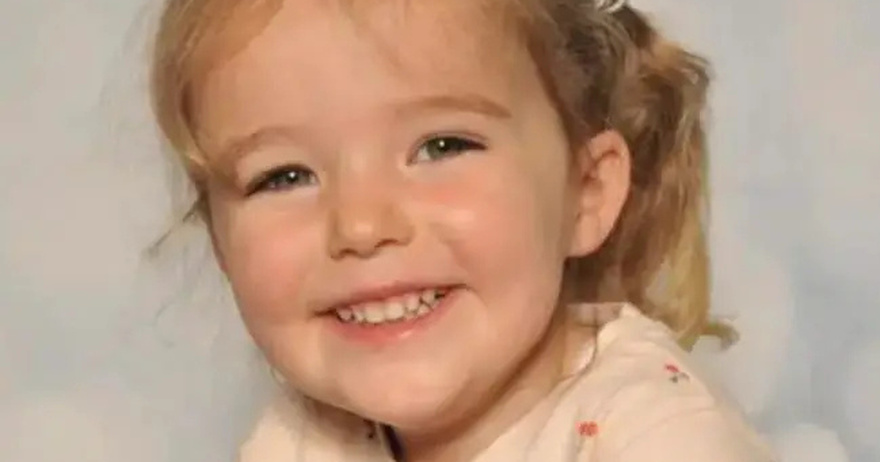Three-year-old Ryleigh Hillcoat-Bee’s tragic story is a somber reminder of the consequences of missed medical opportunities. Diagnosed posthumously with rhabdomyolysis, an extremely rare condition that affects one in 200,000 people in the UK, Ryleigh’s life might have been saved had the warning signs been properly identified during her initial hospital visit.
Early Symptoms Ignored
At one point in hospital Ryleigh’s urine was ‘as dark as Coca-Cola’ but nurses suggested the sample could have been contaminated with diarrhoea, despite Caroline and Andrew not noticing any
In August 2021, Ryleigh was admitted to Blackpool Victoria Hospital after becoming lethargic and floppy following a family trip. Despite presenting with abnormal blood test results, including alarmingly high levels of Creatine Kinase—a potential indicator of muscle injury or disease—doctors attributed her condition to a chest infection or hepatitis and sent her home.
Red Flags Overlooked
It was only months after Ryleigh’s death, after multiple tests were carried out by experts at Alder Hey, Sheffield and Newcastle hospitals, a repeat whole genome sequencing revealed she had a Lipin 1 deficiency
Coroner Alan Wilson criticized the hospital for missing critical “red flags” during Ryleigh’s stay. Her lack of mobility and dark urine, resembling “Coca-Cola,” were dismissed, with nurses speculating it might have been contaminated. Despite clear indications of a neuromuscular issue, the necessary follow-up care was not organized.
The Tragic Outcome
Ryleigh Hilcoat Bee, aged 3, died with an undiagnosed illness called Rhabdomyolysis.
Three months after her discharge, Ryleigh’s condition took a fatal turn. She was rushed back to the same hospital on November 8, 2021, after experiencing breathing difficulties. Her health rapidly deteriorated, and she suffered a cardiac arrest, passing away that morning.
The Rare and Dangerous Rhabdomyolysis
Representing Ryleigh’s parents Diane Rostron, medical negligence solicitor, said: ‘The hospital was given clear advice from colleagues in Leeds during Ryleigh’s admission in August 2021 to seek specialist advice from a neuromuscular specialist’
Rhabdomyolysis causes muscle tissue breakdown, releasing toxic substances into the bloodstream that can damage the kidneys and heart. The condition can be triggered by infections, trauma, or genetic factors. In Ryleigh’s case, it was later revealed that she had Lipin 1 deficiency, an ultra-rare metabolic disorder.
Parents Left Devastated
Ryleigh Hillcoat-Bee suffered a cardiac arrest and died on Monday, November 8. Three months prior she was sent home from A&E despite tests showing she had ‘extraordinarily high’ levels of Creatine Kinase, which can indicate a muscle injury or disease
Ryleigh’s parents, Andrew and Caroline, were left heartbroken and “infuriated” after the hospital contacted them to schedule follow-up tests just days after her passing. “We believe that Ryleigh should still be here today,” they said, expressing their frustration at the hospital’s failure to act on clear advice from specialists.
Legal and Institutional Response
Caroline’s sister-in-law Katie Hobbs ran the Royal Parks Half Marathon in 2022 and set up a fundraiser to raise money for the charity which raised more than £3,000
Diane Rostron, the family’s medical negligence solicitor, pointed out that Blackpool Victoria Hospital had been advised to seek input from a neuromuscular specialist during Ryleigh’s initial admission. This critical step could have led to an earlier diagnosis and potentially life-saving interventions.
Hospital’s Commitment to Learning
After arriving at Blackpool Victoria Hospital (pictured) on November 8, 2021, Ryleigh’s condition rapidly deteriorated. She suffered a cardiac arrest and died there, the same hospital where she was born
Chris Barben, Executive Medical Director at Blackpool Teaching Hospitals NHS Foundation Trust, offered condolences to Ryleigh’s family and promised to address the Coroner’s findings. “We will carefully consider what happened to ensure such an incident does not occur again,” he said.
A Legacy of Advocacy
Ryleigh pictured with her parents Andrew and Caroline who said they were left ‘infuriated’ after the hospital phoned to arrange the follow-up tests a few days after her death. Now they have vowed to sue the hospital where she was treated
Ryleigh’s family is now advocating for awareness of rare conditions like rhabdomyolysis. Supported by The Compassionate Friends charity, they hope their story will drive systemic improvements in healthcare and prevent other families from enduring similar tragedies.
Blake Shelton Reveals the ‘Key to Happiness’ with Gwen Stefani After 10 Years Together
76-year-old man, paralyzed from polio at 6, was one of the last people with an iron lung: ‘My life is incredible’
The unbelievable story of Amanda Scarpinati moves me to tears
The husband spent a week on the coast with an “acquaintance,” and when he came back, he was stunned by what he saw.
